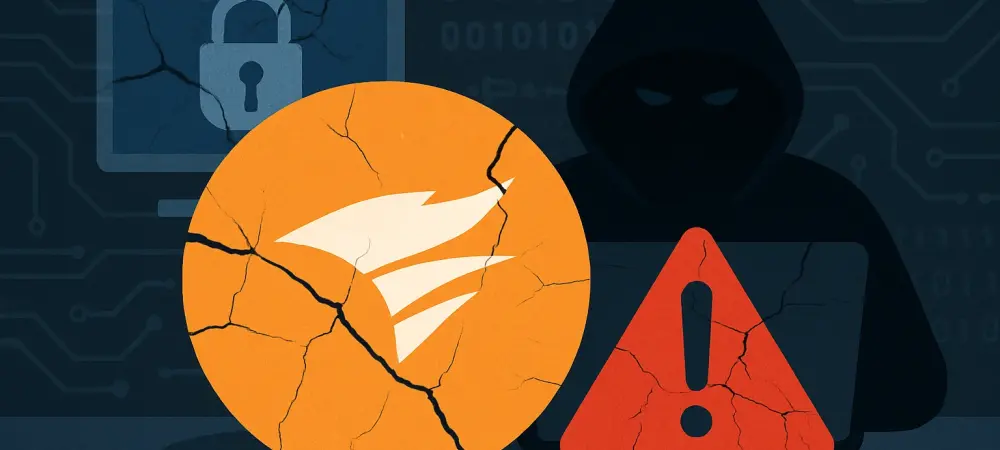In an era where cybersecurity threats loom larger than ever, a critical vulnerability in SolarWinds’ Web Help Desk software has once again thrust the company into the spotlight, raising urgent questions about the security of widely used IT management tools and the potential risks to organizations worldwide. Identified as CVE-2025-26399, this flaw carries a staggering CVSS score of 9.8, signaling a severe risk that could allow unauthenticated attackers to execute arbitrary commands on affected systems. Impacting version 12.8.7 and all prior releases, the vulnerability underscores a persistent challenge for SolarWinds, a company still grappling with the fallout from past high-profile breaches. As organizations worldwide rely on such software for critical operations, the stakes couldn’t be higher, prompting a closer examination of whether the latest fixes will hold or if deeper systemic issues remain unresolved.
Addressing the Latest Threat
Unpacking the Severity of CVE-2025-26399
The discovery of CVE-2025-26399 in SolarWinds’ Web Help Desk software has sent ripples through the cybersecurity community, primarily due to its potential to grant attackers complete control over compromised systems through deserialization of untrusted data. Rated at a near-perfect CVSS score of 9.8, this vulnerability poses an immediate and catastrophic threat, as it requires no authentication for exploitation. Affecting a wide range of software versions up to 12.8.7, the flaw exposes countless organizations to the risk of data breaches and system hijacking. SolarWinds has responded swiftly with hotfix 12.8.7 HF1, a patch designed to mitigate the issue. Yet, the gravity of the situation cannot be overstated, as any delay in applying this update could leave systems vulnerable to malicious actors who might exploit the flaw for espionage or disruption. This urgency is compounded by the software’s role in managing IT support tickets, often containing sensitive internal information.
A Patch Under Scrutiny
While SolarWinds’ release of hotfix 12.8.7 HF1 marks a proactive step in addressing CVE-2025-26399, skepticism lingers about the effectiveness of this solution given the company’s history with similar flaws. This latest vulnerability is not an isolated incident but rather a bypass of earlier patches for CVE-2024-28988 and CVE-2024-28986, both of which also carried a CVSS score of 9.8 and enabled remote code execution. Discovered by an anonymous researcher through a respected zero-day initiative, the flaw has not yet shown evidence of active exploitation as of the most recent advisory. However, the cybersecurity community remains on edge, aware that the window for mitigation is narrow. Experts caution that even with the patch in place, the underlying deserialization issue—a recurring theme in SolarWinds’ software—might still harbor unaddressed risks, necessitating rigorous testing and monitoring by affected organizations to ensure their environments are secure.
Historical Context and Future Risks
Recurring Vulnerabilities Raise Concerns
The pattern of recurring security flaws in SolarWinds’ Web Help Desk software paints a troubling picture of persistent challenges in eliminating critical vulnerabilities, with CVE-2025-26399 being the latest in a series of high-severity issues. Earlier flaws, addressed just months ago, revealed similar weaknesses in the software’s handling of user-supplied data, particularly within the AjaxProxy component, allowing attackers to bypass authentication and execute harmful code. Cybersecurity analysts, including voices like Ryan Dewhurst from watchTowr, have expressed concern over SolarWinds’ apparent struggle to fully resolve these deserialization problems despite multiple patch cycles. This repetition not only erodes confidence in the software’s reliability but also highlights a broader issue of software design that may require more than surface-level fixes. For organizations depending on this tool, the recurring nature of such threats demands heightened vigilance and contingency planning.
Legacy of Past Breaches and Industry Impact
Reflecting on SolarWinds’ broader history, the shadow of the 2020 supply chain attack—linked to state-sponsored actors—continues to influence perceptions of the company’s security posture, especially as new vulnerabilities like CVE-2025-26399 emerge. That incident, which compromised numerous government agencies, set a precedent for the devastating potential of flaws in widely used software, amplifying the urgency surrounding each new discovery. Although prior iterations of Web Help Desk vulnerabilities were added to the U.S. Cybersecurity and Infrastructure Security Agency’s Known Exploited Vulnerabilities catalog, indicating real-world attacks, specifics remain undisclosed. This historical context fuels apprehension that even if the latest flaw isn’t currently exploited, it may only be a matter of time before threat actors capitalize on it. The industry watches closely, recognizing that SolarWinds’ ability to definitively address these issues could shape trust in IT management tools for years to come.

